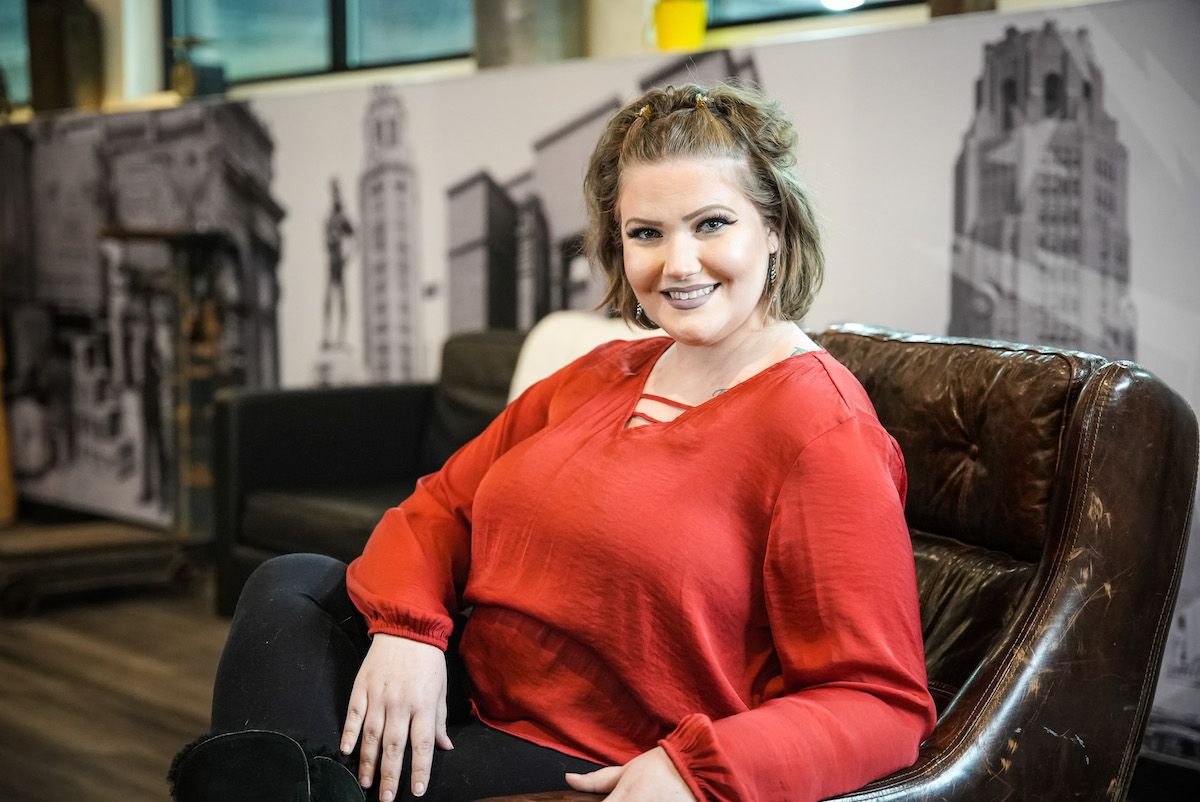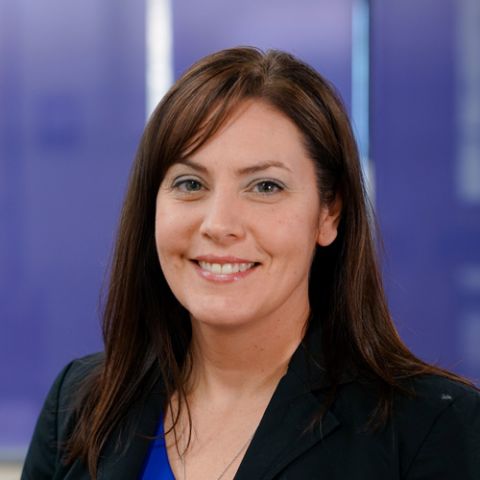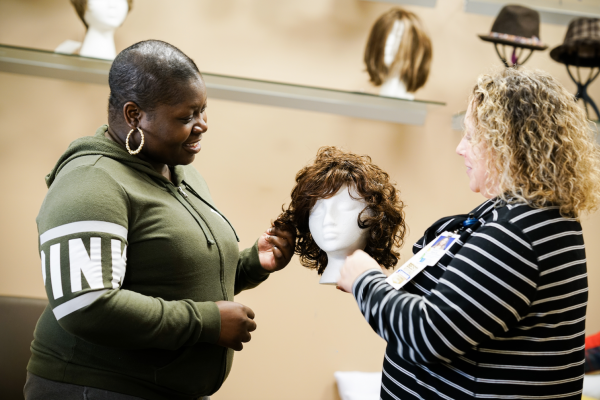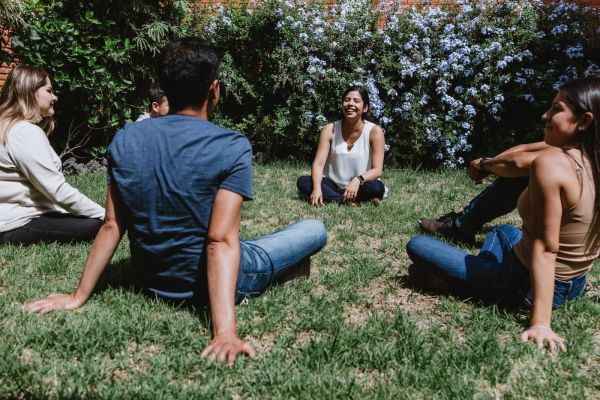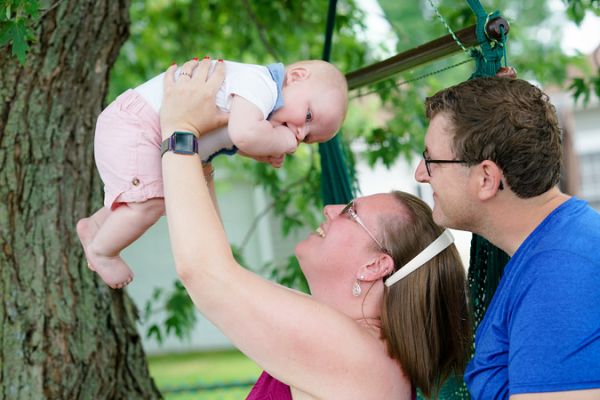Four years ago, Caitlin Sparceno had just begun a new chapter in her life. A recent college graduate with a degree in psychology, she had started her first real “career” job, but was still so new, she hadn’t yet left the waitressing job she had held for years. She envisioned a bright future that included career advancement, graduate school, maybe even love.
But her plans came to a halt the day she learned the swollen lymph nodes in her neck and underarm that she believed were from recurrent mononucleosis were actually cancer. “It was November 28, 2016,” she says. “I was 24 years old and I had Hodgkin lymphoma. I had just finished training at work, and now I had to tell them I needed six months off. I didn’t know if I even qualified for leave. I basically had to drop everything to go through treatment.”
Once the treatment plan was confirmed and a port implanted, her cancer treatment got rolling pretty fast. She started chemotherapy in early January, and every two weeks for six months she returned to Roswell Park’s outpatient Chemotherapy and Infusion Center for a marathon day of treatment. Though the treatment was hard, it worked.
Pushing the reset button
The “new normal” after treatment is a difficult transition. “You hear the words ‘cancer-free’ and you are cleared to go live your life. But you can’t start from where you were. You just have to pick up the pieces that you can and go from there. But I did it. I moved on," Caitlin recalls. "I had my port taken out, I dyed my hair blue and got a tattoo that says ‘Thriver,’ which goes beyond just surviving.”
Caitlin was able to return to her job and soon received a promotion. Then she enrolled in graduate school to become a clinical psychologist. She even decided that the former acquaintance she had begun dating a few months into her treatment was “her person.”
“I was feeling completely fine,” she says. Until the day that a routine follow-up scan detected unusual tissue growth on her thymus gland. The biopsy confirmed that she had relapsed. She received the news on November 28 — exactly two years to the day from her initial diagnosis. “I felt so knocked down. I knew I would have to quit everything to go back to being a patient.”
This time, her treatment involved strong “salvage” chemotherapy designed to bring about speedy remission in preparation for stem cell transplant. The chemotherapy and transplant meant being an inpatient for weeks, and the treatment also was likely to leave her infertile. A consultation with oncologist Denise Rokitka, MD, MPH, Director of Roswell Park’s Young Adult and Oncofertility programs, led quickly to the process of harvesting eggs and freezing embryos. “Just thinking that there’s a possibility for a baby gave me great peace of mind as I started chemotherapy again,” says Caitlin.
When she entered Roswell Park to embark on her second treatment plan, she had a few things to help keep her mind busy and her spirits up. She was finishing her first semester of graduate school from her hospital bed — and planning a wedding. “Her person,” Adam, had just proposed. Caitlin’s transplant was a success.
Facing a diagnosis of cancer in your 20s or 30s?
Our Young Adult program offers nationally designated comprehensive cancer care, plus support and services specifically designed to help you and your family now — and for years to come.
Learn MoreEnter the coronavirus pandemic
Caitlin and Adam planned their big wedding for September 2020. It would be at Hotel Henry, a 150-year-old historic castle-like structure in Buffalo, New York, that once served as a psychiatric hospital. The psychologist in Caitlin was thrilled with it. But then came the worldwide coronavirus pandemic that changed everything.
“We decided to push ahead and we kept our date, but we got married in a park with just our close families around us. After having cancer twice and then a pandemic, I refuse to put anything else on hold!” she says.
As soon as Caitlin had medical clearance, she and Adam decided to begin in vitro fertilization with one of their embryos. A week before her appointment, Caitlin discovered she was already pregnant. When November 28, 2020, rolled around, Caitlin declared she had broken the cycle. “I am carrying life,” she says.
She remembers how different it was when she was first diagnosed. “I recall thinking that I would be forever alone, that no one would want to be with a cancer girl who was always going to be sick, that I’d never get married and would never have kids, because I’d be sterile. Now, after cancer, I’m married and going to have a baby in May. You can’t make this up. It’s wild.”
Editor’s Note: Cancer patient outcomes and experiences may vary, even for those with the same type of cancer. An individual patient’s story should not be used as a prediction of how another patient will respond to treatment. Roswell Park is transparent about the survival rates of our patients as compared to national standards, and provides this information, when available, within the cancer type sections of this website.
